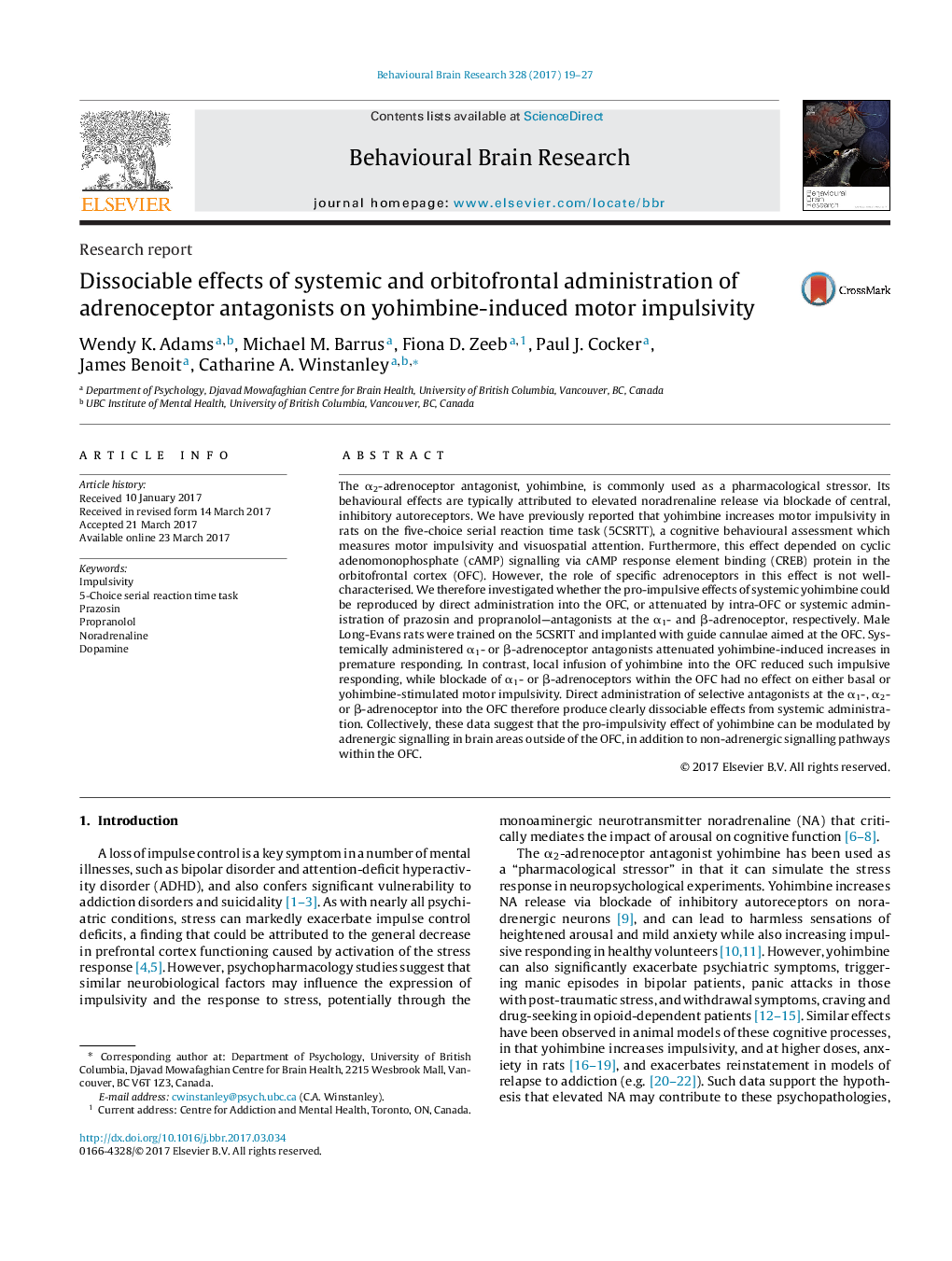| کد مقاله | کد نشریه | سال انتشار | مقاله انگلیسی | نسخه تمام متن |
|---|---|---|---|---|
| 5735147 | 1612907 | 2017 | 9 صفحه PDF | دانلود رایگان |
عنوان انگلیسی مقاله ISI
Dissociable effects of systemic and orbitofrontal administration of adrenoceptor antagonists on yohimbine-induced motor impulsivity
ترجمه فارسی عنوان
اثرات غیر قابل انکار از تجویز سیستماتیک و اوربیتوفرنتال آنتاگونیستهای آدرنرژیک بر روی امپدانس مولکولی ناشی از یوهیمبینین
دانلود مقاله + سفارش ترجمه
دانلود مقاله ISI انگلیسی
رایگان برای ایرانیان
کلمات کلیدی
تکانشی، کار 5 ساعته واکنش سریال، پرازوسین، پروپرانولول، نورآدرنالین، دوپامین،
موضوعات مرتبط
علوم زیستی و بیوفناوری
علم عصب شناسی
علوم اعصاب رفتاری
چکیده انگلیسی
The α2-adrenoceptor antagonist, yohimbine, is commonly used as a pharmacological stressor. Its behavioural effects are typically attributed to elevated noradrenaline release via blockade of central, inhibitory autoreceptors. We have previously reported that yohimbine increases motor impulsivity in rats on the five-choice serial reaction time task (5CSRTT), a cognitive behavioural assessment which measures motor impulsivity and visuospatial attention. Furthermore, this effect depended on cyclic adenomonophosphate (cAMP) signalling via cAMP response element binding (CREB) protein in the orbitofrontal cortex (OFC). However, the role of specific adrenoceptors in this effect is not well-characterised. We therefore investigated whether the pro-impulsive effects of systemic yohimbine could be reproduced by direct administration into the OFC, or attenuated by intra-OFC or systemic administration of prazosin and propranolol-antagonists at the α1- and β-adrenoceptor, respectively. Male Long-Evans rats were trained on the 5CSRTT and implanted with guide cannulae aimed at the OFC. Systemically administered α1- or β-adrenoceptor antagonists attenuated yohimbine-induced increases in premature responding. In contrast, local infusion of yohimbine into the OFC reduced such impulsive responding, while blockade of α1- or β-adrenoceptors within the OFC had no effect on either basal or yohimbine-stimulated motor impulsivity. Direct administration of selective antagonists at the α1-, α2- or β-adrenoceptor into the OFC therefore produce clearly dissociable effects from systemic administration. Collectively, these data suggest that the pro-impulsivity effect of yohimbine can be modulated by adrenergic signalling in brain areas outside of the OFC, in addition to non-adrenergic signalling pathways within the OFC.
ناشر
Database: Elsevier - ScienceDirect (ساینس دایرکت)
Journal: Behavioural Brain Research - Volume 328, 15 June 2017, Pages 19-27
Journal: Behavioural Brain Research - Volume 328, 15 June 2017, Pages 19-27
نویسندگان
Wendy K. Adams, Michael M. Barrus, Fiona D. Zeeb, Paul J. Cocker, James Benoit, Catharine A. Winstanley,
